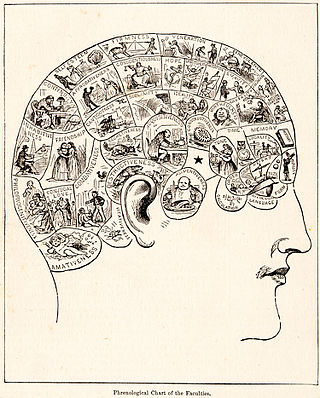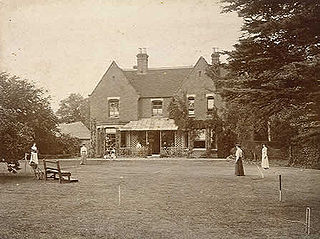Related Research Articles

Pseudoscience consists of statements, beliefs, or practices that claim to be both scientific and factual but are incompatible with the scientific method. Pseudoscience is often characterized by contradictory, exaggerated or unfalsifiable claims; reliance on confirmation bias rather than rigorous attempts at refutation; lack of openness to evaluation by other experts; absence of systematic practices when developing hypotheses; and continued adherence long after the pseudoscientific hypotheses have been experimentally discredited. It is not the same as junk science.
A theory is a rational type of abstract thinking about a phenomenon, or the results of such thinking. The process of contemplative and rational thinking is often associated with such processes as observational study or research. Theories may be scientific, belong to a non-scientific discipline, or no discipline at all. Depending on the context, a theory's assertions might, for example, include generalized explanations of how nature works. The word has its roots in ancient Greek, but in modern use it has taken on several related meanings.

In their most common sense, the terms thought and thinking refer to conscious cognitive processes that can happen independently of sensory stimulation. Their most paradigmatic forms are judging, reasoning, concept formation, problem solving, and deliberation. But other mental processes, like considering an idea, memory, or imagination, are also often included. These processes can happen internally independent of the sensory organs, unlike perception. But when understood in the widest sense, any mental event may be understood as a form of thinking, including perception and unconscious mental processes. In a slightly different sense, the term thought refers not to the mental processes themselves but to mental states or systems of ideas brought about by these processes.
An explanation is a set of statements usually constructed to describe a set of facts which clarifies the causes, context, and consequences of those facts. It may establish rules or laws, and may clarify the existing rules or laws in relation to any objects or phenomena examined.
Critical thinking is the analysis of available facts, evidence, observations, and arguments in order to form a judgement by the application of rational, skeptical, and unbiased analyses and evaluation. The application of critical thinking includes self-directed, self-disciplined, self-monitored, and self-corrective habits of the mind, thus a critical thinker is a person who practices the skills of critical thinking or has been trained and educated in its disciplines. Philosopher Richard W. Paul said that the mind of a critical thinker engages the person's intellectual abilities and personality traits. Critical thinking presupposes assent to rigorous standards of excellence and mindful command of their use in effective communication and problem solving, and a commitment to overcome egocentrism and sociocentrism.
Early modern philosophy The early modern era of philosophy was a progressive movement of Western thought, exploring through theories and discourse such topics as mind and matter, is a period in the history of philosophy that overlaps with the beginning of the period known as modern philosophy. It succeeded in the medieval era of philosophy. Early modern philosophy is usually thought to have occurred between the 16th and 18th centuries, though some philosophers and historians may put this period slightly earlier. During this time, influential philosophers included Descartes, Locke, Hume, and Kant, all of whom contributed to the current understanding of philosophy.

Charlie Dunbar Broad, usually cited as C. D. Broad, was an English epistemologist, historian of philosophy, philosopher of science, moral philosopher, and writer on the philosophical aspects of psychical research. He was known for his thorough and dispassionate examinations of arguments in such works as Scientific Thought (1923), The Mind and Its Place in Nature (1925), and Examination of McTaggart's Philosophy.
Commensurability is a concept in the philosophy of science whereby scientific theories are said to be "commensurable" if scientists can discuss the theories using a shared nomenclature that allows direct comparison of them to determine which one is more valid or useful. On the other hand, theories are incommensurable if they are embedded in starkly contrasting conceptual frameworks whose languages do not overlap sufficiently to permit scientists to directly compare the theories or to cite empirical evidence favoring one theory over the other. Discussed by Ludwik Fleck in the 1930s, and popularized by Thomas Kuhn in the 1960s, the problem of incommensurability results in scientists talking past each other, as it were, while comparison of theories is muddled by confusions about terms, contexts and consequences.

Robert Todd Carroll was an American author, philosopher and academic, best known for The Skeptic's Dictionary. He described himself as a naturalist, an atheist, a materialist, a metaphysical libertarian, and a positivist. In 2010 he was elected a fellow of the Committee for Skeptical Inquiry. He was a professor of philosophy at Sacramento City College from 1977 until his retirement in 2007.

The Davy Medal is awarded by the Royal Society of London "for an outstandingly important recent discovery in any branch of chemistry". Named after Humphry Davy, the medal is awarded with a monetary gift, initially of £1000. Receiving the Davy Medal has been identified as a potential precursor to being awarded the Nobel Prize in Chemistry, with 22 scientists as of 2022 having been awarded the medal prior to becoming Nobel laureates, according to an analysis by the Royal Society of Chemistry.

James Webster Rachels was an American philosopher who specialized in ethics and animal rights.
Richard Carl Jeffrey was an American philosopher, logician, and probability theorist. He is best known for developing and championing the philosophy of radical probabilism and the associated heuristic of probability kinematics, also known as Jeffrey conditioning.
Michael John Scriven was a British-born Australian polymath and academic philosopher, best known for his contributions to the theory and practice of evaluation.
The philosophy of engineering is an emerging discipline that considers what engineering is, what engineers do, and how their work affects society, and thus includes aspects of ethics and aesthetics, as well as the ontology, epistemology, etc. that might be studied in, for example, the philosophy of science or the philosophy of technology.
Two-level utilitarianism is a utilitarian theory of ethics developed by R. M. Hare. According to the theory, a person's moral decisions should be based on a set of moral rules, except in certain rare situations where it is more appropriate to engage in a 'critical' level of moral reasoning.

The Stone Tape Theory is the speculation that ghosts and hauntings are analogous to tape recordings: that mental impressions during emotional or traumatic events can be projected in the form of energy, "recorded" onto rocks and "replayed" under certain conditions. The idea draws inspiration from and shares similarities with views of 19th-century intellectualists and psychic researchers, such as Charles Babbage, Eleonor Sidgwick and Edmund Gurney. Contemporarily, the concept was popularized by a 1972 Christmas ghost story called The Stone Tape, produced by the BBC. Following the play's popularity, the idea and the term "stone tape" were retrospectively and inaccurately attributed to the British archaeologist turned parapsychologist T. C. Lethbridge, who believed that ghosts were not spirits of the deceased, but were simply non-interactive recordings similar to a movie.

Informal logic encompasses the principles of logic and logical thought outside of a formal setting. However, the precise definition of "informal logic" is a matter of some dispute. Ralph H. Johnson and J. Anthony Blair define informal logic as "a branch of logic whose task is to develop non-formal standards, criteria, procedures for the analysis, interpretation, evaluation, criticism and construction of argumentation." This definition reflects what had been implicit in their practice and what others were doing in their informal logic texts.

A hypothesis is a proposed explanation for a phenomenon. For a hypothesis to be a scientific hypothesis, the scientific method requires that one can test it. Scientists generally base scientific hypotheses on previous observations that cannot satisfactorily be explained with the available scientific theories. Even though the words "hypothesis" and "theory" are often used interchangeably, a scientific hypothesis is not the same as a scientific theory. A working hypothesis is a provisionally accepted hypothesis proposed for further research in a process beginning with an educated guess or thought.
Ralph Henry Johnson is a Canadian American philosopher, born in Detroit, Michigan. Johnson has been credited as one of the founding members of the informal logic movement in North America, along with J. Anthony Blair who co-published one of the movement's most influential texts, Logical Self-Defense, with Johnson. Alongside its founder, Blair, Johnson co-directed the Centre for Research in Reasoning, Argumentation, and Rhetoric at the University of Windsor. As Johnson and Blair write in the preface to the newest edition of Logical Self-Defense on the influential nature of the text:
"We might note that the theoretical perspective introduced in Logical Self-Defense has proved quite influential among textbook authors. It is to be found in modified form in A Practical Study of Argument by Trudy Govier, in Attacking Faulty Reasoning by T. Edward Damer, in Logic in Everyday Life and Open Minds and Everyday Reasoning by Zachary Seech, in Thinking Logically by James B. Freeman, and in Good Reasoning Matters by Leo Groarke and Christopher W. Tindale."
Elliott Mendelson was an American logician. He was a professor of mathematics at Queens College of the City University of New York, and the Graduate Center, CUNY. He was Jr. Fellow, Society of Fellows, Harvard University, 1956–58.
References
- ↑ Schick, Theodore; Vaughn, Lewis (2014). "Criteria of Adequacy". How to Think about Weird Things: Critical Thinking for a New Age (7th ed.). McGraw-Hill. pp. 171–181. ISBN 978-0-07-8038365.
{{cite book}}: CS1 maint: date and year (link)